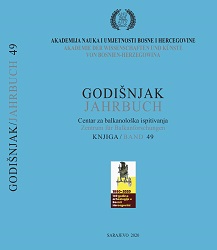Magic and Hodžas as Magic Specialists in Contemporary Bosnia and Herzegovina
Magic and Hodžas as Magic Specialists in Contemporary Bosnia and Herzegovina
Author(s): Mirjam MencejSubject(s): Customs / Folklore, Islam studies, Sociology of Religion
Published by: Akademija Nauka i Umjetnosti Bosne i Hercegovine
Keywords: magic; witchcraft; Bosnia and Herzegovina; priest; hodža;
Summary/Abstract: While the early scholars thought that magic practices and beliefs would soon disappear, research from the second half of the twentieth and 21th centuries in Europe testifies to the fact that many people continue to believe in the effects of magic, and that counter-magic continues to be practiced. This paper gives a short overview of magic-related beliefs and practices in 21th century rural Bosnia and Herzegovina. It is based on fieldwork that I conducted in the countryside from 2016 to 2019, among the population of all three major ethnic groups, i.e., Bosniaks, Croats and Serbs, as well as some Roma. Fear of magic is rather widespread: many interlocutors claimed to have suffered the consequences of bewitchment or narrated about the bewitchment experiences of their close relatives and acquaintances. While narratives on bewitchments referring to the time before the war were often related to bewitched cows and milk, after the war they mainly concern psychological and psychosomatic disorders, anxiety or depression, marital problems, problems within the family, but also unacceptable behaviour (such as aggressiveness, insubordination, cheating etc.) as well as infertility and bachelorhood, which are most often explained as a consequence of someone else’s magic. To counteract the effects of bewitchment, people turn to various specialists, among whom the most popular are Muslim clerics called hodžas. In spite of their help against bewitchment, their reputation is generally extremely ambivalent: dealing with “magic” is considered to be contrary to Islamic teachings; taking money from people in distress is deemed problematic; and their knowledge triggers ambivalent attitudes.
Journal: Godišnjak Centra za balkanološka ispitivanja
- Issue Year: 2020
- Issue No: 49
- Page Range: 171-196
- Page Count: 26
- Language: English

